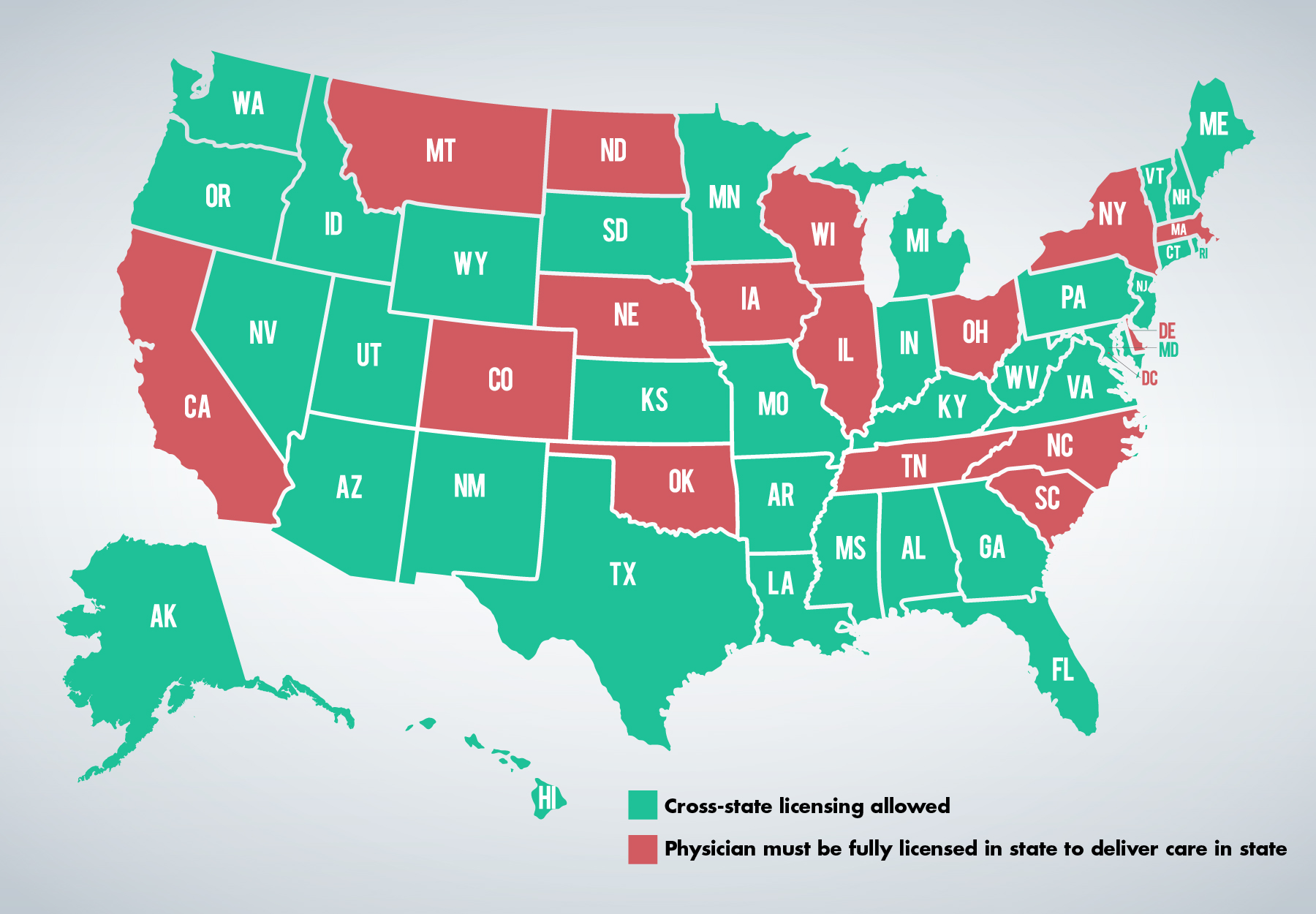The State of State Licensing Law Restrictions on Telehealth
With temporary waivers of restriction relating to telehealth likely to end soon, here’s a roundup of the current state of state telehealth licensing law.

Convention dictates that any story about telehealth in the US begins by noting how telehealth emerged as a cost-effective, popular, and widely utilized alternative to in-person care during the COVID-19 pandemic. Of course, it did. But you already know that. The real question is how sustainable the telehealth surge will prove to be. The answer to that question, in large part, will depend on what regulators decide to do next. With the public health emergency nearing its end, federal and state governments will inevitably roll back the temporary waivers of restrictions on the practice of delivering health care via telehealth visits. Among these laws, few are more crucial than state medical licensing laws. Here’s a roundup of current state telehealth licensing law.
State Licensing Laws
One of the advantages of telehealth is how it breaks down geographical boundaries separating providers from patients. However, this benefit may be lost in states where licensing laws require that healthcare providers be licensed not only in the state from which they deliver care but also the state in which the patient who receives it is located. Thus, for example, a physician who’s licensed in California can’t provide telehealth to a patient in New York without a state license, exemption, or waiver.
During the pandemic, most states issued waivers temporarily relaxing their licensing rules to allow for out-of-state providers to deliver telehealth to patients in the state. However, those waivers either have or will expire soon, meaning that pre-pandemic licensing restrictions will apply again. The good news is that since the pandemic began, a few states have amended their medical licensing requirements to accommodate telehealth. More significantly, even before the pandemic, states made significant progress in medical licensing reform with telehealth in mind.
State Licensing Exemptions
Cross-Licensing Rules
Medical licensing laws in more than 30 states include what are called cross-state licensing provisions that allow an out-of-state provider to deliver services via telehealth, provided that certain conditions are met. Such conditions may include either one or some combination of requirements that the out-of-state providers:
- Be in good standing under the licensing laws of their own state;
- Have a pre-existing provider-patient relationship with the in-state patient;
- Furnish services only in consultation with a duly licensed in-state provider;
- Agree to be bound by the medical malpractice and other licensing requirements of the state in which care is provided;
- Limit their out-of-state services to occasional consultations; and/or
- Agree not to open a practice in the state where the patient is located.
In terms of the dynamic, there are four basic models for cross-state licensing:
1. State Licensing or Registration
There are 15 states (FL, GA, KS, LA, NV, ND, NM, OR, PA, SD, TX, VT, WV) where state medical boards can issue special licenses or waivers allowing out-of-state providers to deliver telehealth care in the state. How providers secure those licenses or waivers varies by state. In Florida, Georgia, Vermont, and West Virginia, all the provider must do is register. In other states, providers must obtain a special license or permit to deliver telehealth from outside of the state.
2. Specific Exemptions for Telehealth
There are six states where licensing laws banning out-of-state practice don’t apply to telehealth—Alaska, Arizona, Connecticut, Maine, Maryland, and Minnesota. In most cases, the out-of-state provider must register with the state and/or accept certain conditions. In Idaho and Utah, the exemption for out-of-state care applies generally and not just to telehealth.
3. Limited Non-Telehealth Exemptions
Some states include exemptions allowing for out-of-state care, including but not limited to telehealth, only for certain limited purposes. Examples:
- Provider can consult with a licensed provider in the state but not treat an in-state patient directly (HI, KY, MS, VA, WA);
- Provider can provide episodic consultations (AL, AR, MO, RI, WY);
- Provider can provide consultation services (NH).
4. Interstate Compacts
Many states have joined interstate compacts allowing certain kinds of providers to practice in the state without being licensed there, as long as they hold a license in good standing in their home state. According to the Center for Connected Health Policy (CCHP), a nonprofit organization that tracks telehealth utilization and its related outcomes and costs, there are nine main compacts covering different states and health professions in the US, including:1
| Compact | Members |
| Interstate Medical Licensure Compact | 37 states, DC, Guam |
| Nurse Licensure Compact | 39 states, Guam |
| Physical Therapy Compact | 26 states, DC |
| Psychology Interjurisdictional Compact | 32 states, DC |
| Audiology and Speech-Language Pathology Interstate Compact | 23 states |
| Emergency Medical Services Personnel Licensure Interstate Compact (REPLICA) | 22 states |
| Occupational Therapy Compact | 21 states |
| Counseling Compact | 17 states |
| Advanced Practice Registered Nurse Compact | 3 states |
Cross-State Licensing Laws Across the US
Generally, providers that furnish telehealth services to patients in a different state must have a valid medical license in two states: the state from which they deliver telehealth and the state where the patient receives it. Fortunately, the licensing laws of most states include some kind of exception, exemption, waiver, or other cross-state licensing provisions that allow for out-of-state delivery of telehealth. Licensing rules vary not only by state, but also medical profession. The map below depicts the current state of cross licensing rules for physicians.

References:
Subscribe to view Essential
Start a Free Trial for immediate access to this article